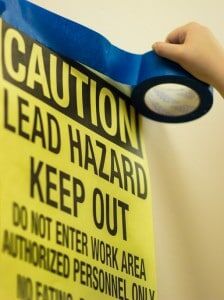Appeals Court Orders the EPA to Change the Rules on Workplace Lead Exposure Immediately
 If you work in an industry with a potential for exposure to lead, you may want to discuss your case with a skilled workers’ compensation attorney from Silverman, McDonald & Friedman. We protect the rights of our clients who have been injured on the job in Wilmington, Newark, Seaford and throughout Delaware.
If you work in an industry with a potential for exposure to lead, you may want to discuss your case with a skilled workers’ compensation attorney from Silverman, McDonald & Friedman. We protect the rights of our clients who have been injured on the job in Wilmington, Newark, Seaford and throughout Delaware.
In December 2017, the Environmental Protection Agency (EPA) said it would take them six more years to develop revised lead paint exposure rules. The Court of Appeals for the Ninth Circuit gave the EPA 90 days to revise lead exposure standards. In issuing a “writ of mandamus,” requiring the EPA to take immediate action. (A writ of mandamus come from the Latin meaning, “we command.” It is issued from a superior court to a subordinate entity to do or stop doing a specific act which the entity is obliged by law to perform.) The EPA had already taken too long to act on a 2009 petition from health and environmental groups who wanted the EPA to further restrict lead paint limitations, and the Court simply insisted that the EPA do their job and address the revised lead standards.
The court ordered the EPA to issue a rule within 90 days, to promulgate a final rule within one year after the proposed rule, and deadlines for the proposed rule and final rule would only be modified if the EPA could prove why a modification was required.
While this case focuses on the hazards of lead paint in home environments because lead is the number one environmental health hazard to children age six and younger, but lead is as much of a danger to workers. When renovation older homes, workers can be exposed to lead paint, which can result in lead poisoning as an occupational disease.
The danger of lead exposure in the workplace
The National Institute for Occupational Safety and Health (NIOSH) reports that lead poisoning can occur when a person is exposed to high levels of lead over a short period of time. A person can swallow, inhale or absorb lead particles through occupational exposure. The lead is absorbed in the body, and it is stored in the bones, blood and tissues. As a person ages, their bones demineralize and release lead from bone tissue back into the body. Symptoms of lead poisoning may include:
- Abdominal pain
- Constipation
- Fatigue
- Headaches
- Irritability
- Loss of appetite
- Memory loss
- Pain, tingling in hands and/or feet
- Weakness
These symptoms may occur slowly over time causing lead poisoning to be easily overlooked. Prolonged lead exposure can lead to a heightened risk for high blood pressure, anemia, heart disease, kidney disease, chronic nephropathy, and reduced fertility. (NIOSH) If you think that you are suffering from lead poisoning, a simple blood test can check your blood lead levels. The CDC defines elevated lead levels in the blood as 5 micrograms per deciliter or greater.
Preventing lead exposure in the workplace
An article in Safety and Health reports that OSHA estimates about 804,000 workers in general industry and 838,000 workers in the construction industry are potentially exposed to lead. OSHA has workplace health standards to protect workers from lead exposure, and there is a protocol that employers must follow if workers become exposed to lead. These requirements help protect workers at work, and prevent them from tracking lead home and exposing family members:
- Test workplace air for lead and test blood-lead levels in workers
- Inform workers if their job involves exposure to lead, and provide safety training
- Establish controls for lead dust and fumes
- Provide protective clothing
- Provide workers with a place to wash their hands and take a shower after their shift
- Provide workers with a place to change into clean clothes, and keep work clothes separate from street clothes
Workers who have been diagnosed with lead poisoning from occupational exposure may with to consult with a workers’ compensation attorney about their legal options.
Our dedicated workers’ compensation attorneys at Silverman, McDonald & Friedman are here to guide you through the claims process. You are welcome to contact us by calling 302-888-2900 or filling out our contact form to schedule a free consultation with a skilled workers’ compensation lawyer in Wilmington, Newark or Seaford today.
Attorney Jeffrey S. Friedman joined Silverman, McDonald & Friedman in 2001. He graduated from Widener University School of Law, and is admitted to practice law in Delaware and Pennsylvania, and in several Federal Circuit courts. He areas of concentration include auto accident and workers’ compensation cases. Read more about Attorney Friedman here.

